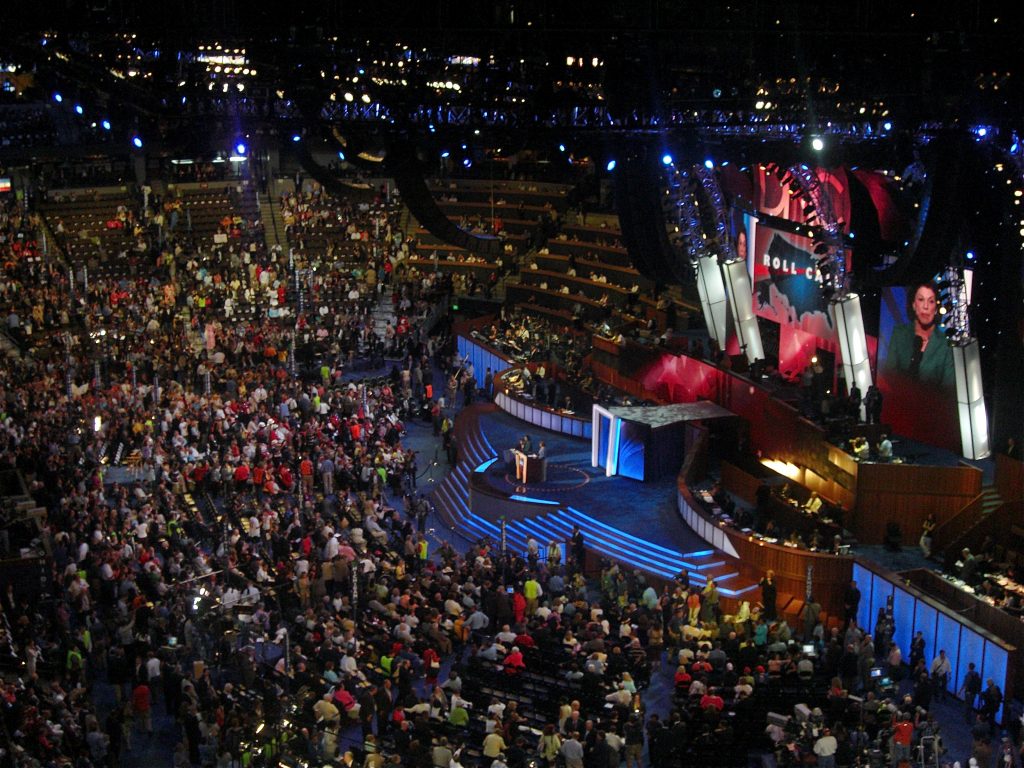
by Nur Kara
The 2016 United States presidential election will be the first I vote in. Although I’ve been old enough to vote for some years now, my political apathy and laziness always took priority. Seeing merely a sprinkle of Asians in the crowd at the Democratic National Convention this week, however, made me reflect not only on my own civic engagement (or lack thereof) as an American-born and raised Muslim South Asian woman, but also of my extended South Asian community.
While we’ve had the undying grit to pioneer much progress in this country for our people, I’m disheartened that research shows we haven’t yet pioneered enough progress for the people.
As young Americans ourselves, many of us first-generation, we know the difficulties that befell our families who chose to trod off the beaten path and seek better lives here in the West. We can attest to the financial, social, religious, cultural, and linguistic ostracism that our families have challenged, time and again, because we’ve degradingly witnessed it first-hand. Our families left behind their families, their homes, sometimes their dreams and their safe havens too, just so that we, their children, may attain the education that will empower and enable us to have the futures that already passed them by.
My own parents came as refugees to the West in 1972, eventually gaining asylum and uprooting to culturally unfamiliar Detroit, Michigan. Neither the high crime rate nor the demographic imbalance of their first home, Detroit, in the 1980s could break their new American spirits. I’m sure many of you have similar histories to share of our people, but we must remember one thing: The people who represent one of the world’s strongest republics and democracies that we call the United States, once permitted us South Asians to deem America home. Via impeding mechanisms or otherwise, we were nonetheless granted rights to residency and citizenship that lawfully added “American” to our “South Asian” designations, and the hope and clout to improve our lives.
Consider the 18th century philosopher Jean-Jacques Rousseau’s Social Contract. An individual truly becomes a citizen when he or she devolves personal powers to align with civil society, to become a small part of a larger nation state driven by communal decisions. This involves a variety of civic action, not limited to charity (whether of time or money) and voting. But how many Asian Americans really do vote each year?
Eligible Asian voters have historically had the lowest recorded registration and voter turnout rates among the most prominent American minorities. Between 1960 and 2010, the Asian American population increased from one million to 17 million, a figure expected to double by 2060. Yet, despite being the fastest growing racial group in the US, according to the Census Bureau, we’re among the least politically engaged. Pew Research Center reported that the 2012 presidential election resulted in a mere 47% voter turnout among Asians—the lowest compared to 48% of Hispanics, 64% of non-Hispanic whites, and 67% of blacks. Furthermore, fewer Asians are registered to vote, at 56%, when compared to Hispanics (59%), blacks (73%), and non-Hispanic whites (73%).
Yes, we could speculate that our political participation lags perhaps because:
- About 74% of Asian Americans are foreign-born. Simple explanations contribute, such as linguistic confusions and partisan inexperience. A scary instance: a friend recently told me that her mother, a Mexican immigrant, was leaning towards Republican presidential nominee Donald Trump because, even though her limited English served as a barrier to actually understanding his political agenda (i.e. building a literal immigrant barrier that would prohibit Mexicans like herself from entering the US), she still recognized him by his popular façade as a business tycoon.
- Neither the Democratic nor Republican parties consistently target Asian American voters. A 2012 survey following the presidential election elucidated that, in the past two years, 52% of Asians hadn’t been contacted by Democrats and 64% hadn’t been contacted by Republicans.
- Conservative anti-immigrant and anti-South Asian sentiment, especially fervent post-9/11, naturally deter us.
But overall, “Asian American” is a HUGE label that trumps actually knowing the beliefs and behaviors of its internal diversities. You’re right—what if it’s not us South Asians slanting the voting slope?
The answer doesn’t matter. The 2016 presidential election should be a wake-up call to our all-encompassing Asian American community and an opportunity to alter the usual stats in every election, local or national, to come. Narrowed down to two, our choices aren’t overwhelming. We can either put our differences, inexperience, and apathy behind us to make the right one (hint: Hillary Clinton), or we can sit quietly on the sidelines and watch our black, white, Hispanic, and added counterparts decide the next POTUS for us. This means forgoing our right as eligible Asian American voters to appoint the government that will set guidelines—on immigration, national security, healthcare, and the economy—that will, regardless of their nature, affect our community as designated citizens.
Paraphrasing from President Barack Obama, are we just going to be spectators in the sport of democracy, or are we going to get in the ring and fight for it? Just as our parents had dreams for us, we also have dreams for our children. Luckily, our parents already did the hard part. It’s now on us to get out there this November 8th and vote to select the candidate that will best ensure our cultural inclusion, relevance, and rights as American citizens. I’m excited to try.
You can register to vote here.




